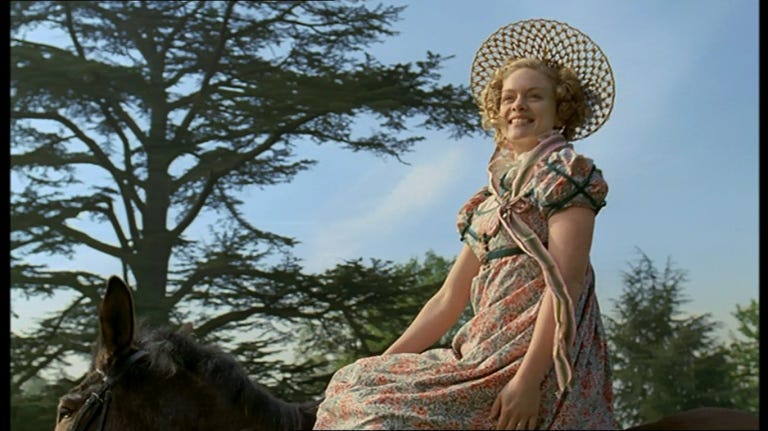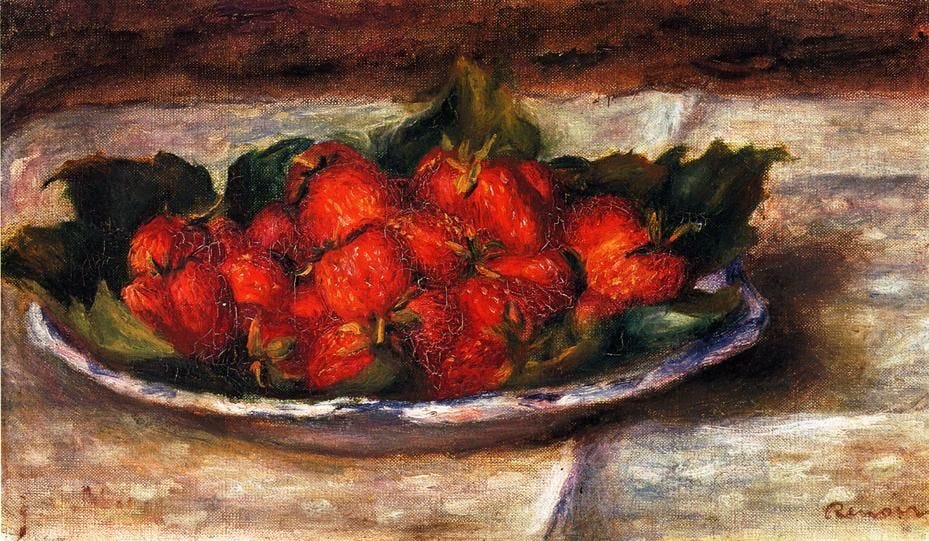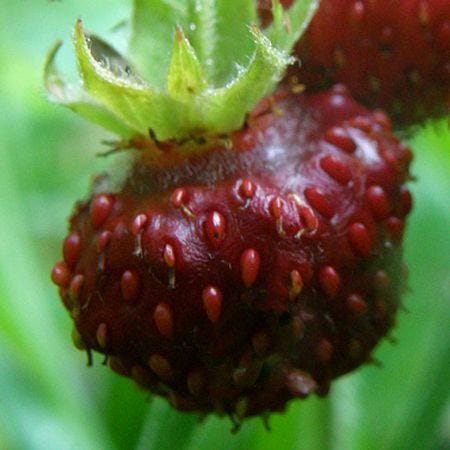Welcome Strawberry Season!
Remember that, according to Mrs. Elton, the "hautboy is infinitely superior."
In June 1815,1 select residents of Highbury are invited to Donwell Abbey by Mr. Knightley for a small strawberry-picking party. The guest list includes Emma, Harriet Smith, Mr. & Mrs. Weston, Jane Fairfax, Miss Bates, Frank Churchill who is late to arrive, & Mr. & Mrs. Elton. Mrs. E. comes dressed in a large bonnet & carries a small basket for the strawberries, which Anne Ewbank tells us was part of the costume for strawberry parties of the 19th century in her article for Atlas Obscura. In America, where these types of parties eventually caught on, Mary Todd Lincoln reportedly enjoyed strawberry parties & even wore a dress with a printed strawberry pattern that’s preserved in the Abraham Lincoln Presidential Library & Museum.
Not a First Lady by any means, Mrs. Elton tries to dress the part of hostess for Mr. Knightley’s strawberry party at Donwell Abbey, even though he wouldn’t allow her to arrange & overcomplicate the details.2 The picnic-like quality of these strawberry festivities—which required little planning & an almost spontaneous gathering of people to pick the red jewels ripened to perfection—was meant to hearken back to a simpler time before industrialization.
If we can believe anything Mrs. Elton says, strawberries are “the best fruit in England.” She does go on about them so, expressing her thoughts on every variety in a way that makes it impossible for anyone to refute her:
“…& Mrs. Elton, in all her apparatus of happiness, her large bonnet & her basket, was very ready to lead the way in gathering, accepting, or talking—strawberries, & only strawberries, could now be thought or spoken of. —The best fruit in England—every body’s favourite—always wholesome.— These the finest beds & finest sorts. —Delightful to gather for one’s self—the only way of really enjoying them. —Morning decidedly the best time—never tired—every sort good—hautboy infinitely superior—no comparison—the others hardly eatable—hautboys very scarce—chili preferred—white wood finest flavour of all—price of strawberries in London—abundance about Bristol—Maple Grove—cultivation—beds when to be renewed—gardeners thinking exactly different—no general rule—gardeners never to be put out of their way—delicious fruit—only too rich to be eaten much of—inferior to cherries—currants more refreshing—only objection of gathering strawberries the stooping—glaring sun—tired to death—could bear it no longer—must go & sit in the shade.”
— Emma, 1815, vol. III, ch. VI, p. 336
Carol Chernega, who has worked in the gardens at Chawton House & co-wrote the book The Garden at Jane Austen’s House: Past and Present, suggests that the dashes Austen uses in the text indicate that Mrs. E. isn’t in a monologue with herself, but a dialogue, if a predominantly one-sided one, with the rest of the guests. “The dashes used as punctuation are the points at which others try to enter the conversation,” she writes in a guest blog post about strawberries in England, “perhaps people even contradict her statements. But she overcomes them every time.” This would account for how little sense Mrs. Elton’s monologue about strawberries actually makes. First they’re “every body’s favourite,” then one variety is better than another, only to find that she believes strawberries are “inferior to cherries.” It’s nonsensical! It’s like she’s in a rave3 about this summer fruit. For a character to rave in Austen, & other works of 19th-century fiction typically written by women, they would speak in a frantic & incoherent manner. It’s clear from the way Mrs. Elton jumps from one thought to the next that she has no idea what she or anyone else is saying. But why is she raving about strawberries? And what, exactly, is a hautboy?

Of the many social anxieties reflected in Emma, the prominent one is British identity & how it should be represented. A few pages after Mrs. Elton’s monologue, we get a passage of Emma’s interior & unexpressed perception of the English countryside as she walks with Mr. Weston:
“It was a sweet view—sweet to the eye & mind. English verdure, English culture, English comfort, seen under a sun bright without being oppressive.”
— Emma, vol. III, ch. VI, p. 338.
Emma’s love of Highbury, love of her home at Hartfield, & love of Donwell Abbey makes her want to protect the simple country life from tradespeople like the Coles or social climbers like Mrs. Elton. The mixing of classes, the loss of a distinct English identity was a fear among the landed gentry as the empire expanded, as English culture extended beyond the country’s borders. The strawberry contains what John Plotz calls “cultural portability.” —An object that embodied “dear old England” & could stand in for it, preserving & protecting a culture from being altered at home & abroad. In his paper “The First Strawberries in India,” Plotz begins by sharing the experience of Harriet Tytler, a 19th-century Anglo-Indian writer & artist, who “was delighted at the novel sight” of two strawberries growing on a plant in India & wanted to taste the fruit, so she “picked & ate them both.” Because she was “born in a land she cannot conceive of as her own & raised to idolize a country she knows only through words, pictures, & stories, Tytler cannot resist the chance to ingest England,” Plotz writes. “Tytler’s strawberry theft exemplifies one of the cultural practices that allowed self-styled exiles to think of England as a tangible alma mater rather than a distant speck on the map.” Strawberries, then, are a product of empire: a source of nostalgia for expatriates in India & other colonized nations, & a cultural unifier for the “inferior cultures” these British expats would have encountered. An object with such a “mobile memory” could, in Plotz’s view, present “a new way of imagining community.”
The strawberry is an interesting symbol for a stable British identity given that it is the product of cross-pollination, especially the variety that Mrs. Elton raves about & would have been sought after in Jane Austen’s time. The musk strawberry, known as hautboy4 in England, was widely cultivated in Europe from the 16th to 19th centuries & is, according to Chernega, notoriously difficult to cross-pollinate. Most of us who are used to the large, shiny-red supermarket variety wouldn’t recognize the hautboy as a strawberry—it looks like a wine-colored raspberry.
In the United States, they haven’t been tasted in more than a century, but a Maryland horticulturist named Harry Jan Swartz, who has attempted to cultivate this Jane Austen-approved strawberry, says it’s meant to be very aromatic with notes of honey, melon, raspberry, & even cheese.5
A European strawberry revolution in the 18th century eventually led to “a larger, tastier strawberry, which is the ancestor of all English varieties known today.” This new variety was called Fragaria X Ananassa, a cross between Fragaria Virginiana from the colonies & Fragaria Chileonsis from Chile—another strawberry Mrs. Elton raves about, “chili preferred,” in her monologue. Austen would have known about these different varieties, as well as the agricultural revolutions that brought them about. Hidden in this strawberry-picking scene, could there be a critique of how industrialization breaks down the strictly-defined barriers of class?
Robin Bates calls our attention to what comes before Mrs. Elton’s incoherent rave about strawberries, which tells us how Emma feels to be back at Donwell Abbey after a long absence. How she feels “honest pride & complacency” as she looks at the house & its “ample gardens.” “The house was larger than Hartfield,” she observes, “& just what it ought to be.” My, how her sister Isabella “had connected herself unexceptionably,” giving them “neither men, nor names, nor places, that could raise a blush.” Emma walked on her own to indulge these feelings “till it was necessary to do as the others did, & collect round the strawberry beds.” Bates is surprised that the paragraph doesn’t end with Emma joining the rest of the party but “continues on.” The long passage goes right from the “ordered” sentences conveying Emma’s thoughts & feelings into Mrs. Elton’s impossible-to-follow talk of strawberries. It’s like Austen wants them to “clash with each other,” Bates writes, showing us how little class this social climber has compared to her superiors, Emma & Mr. Knightley. Bates doesn’t particularly like Austen’s treatment of social climbers, & I’ve seen other readers make the same remark. “Austen felt anxiety about her own class,” they all say. I’m not sure I agree with this reading of Austen, & it’s not because I consider her a writer without fault. I just think that what she’s critiquing is a system of class & etiquette & rules that creates these class jumpers. But it’s also true that Austen isn’t fond of social climbers who used the system to class jump, then fought to keep the class divisions in place to secure their new hard-won status.
Notice how Mrs. E. doesn’t just lack the class of Emma & Mr. Knightley, but also Harriet Smith, Mrs. Weston, Jane Fairfax, &, to a certain extent, Miss Bates. Mrs. Elton possesses the high & mighty attitude of someone who has just risen to the top & can lord her opinions—even over something as mundane as strawberries—over them. She’s presumptuous enough to think she’s equal to Emma & superior to Jane Fairfax, taking it upon herself to find Jane a governess position. A social climber like Mrs. Elton demands the power to declare the “hautboy infinitely superior.”
Enjoy Strawberry Season, everyone! May it be filled with many strawberry-picking parties. Only mind that you keep your gatherings small & free from the Eltons.
The novel tells us that it’s June.
Mr. Knightley would have preferred a simple meal indoors: “My idea of the simple and the natural will be to have the table spread in the dining-room. The nature and the simplicity of gentlemen and ladies, with their servants and furniture, I think is best observed by meals within doors." (386)
Attended this lovely webinar from Professor Lesley Peterson & wrote my own rave, begging my creative muse not to abandon me.
Perhaps taken from hautbois, how it was known in France.
Part of Swartz’s struggle back in 2006 wasn’t just getting the flavor of the musk straweberry right, but figuring out how to have a commercially-competitive yield. I still haven’t heard of musk strawberries in the U.S., so I guess Swartz is still waiting for a breakthrough.






